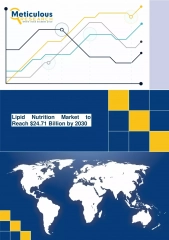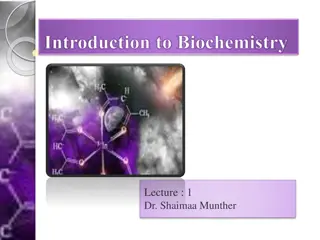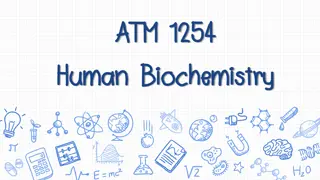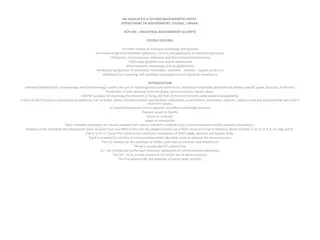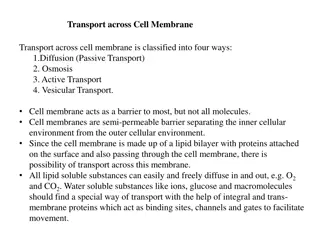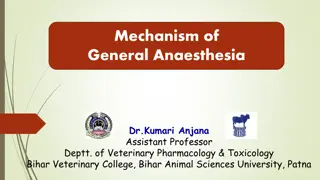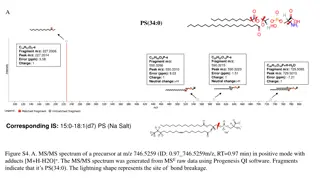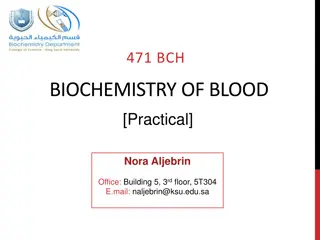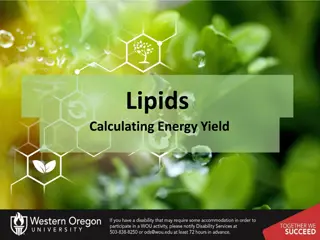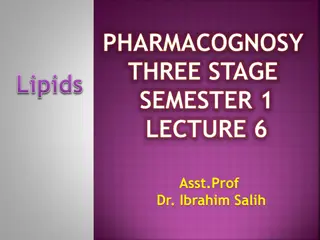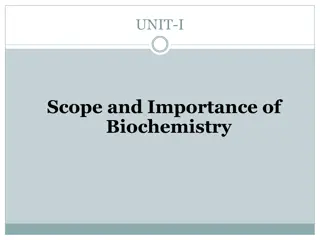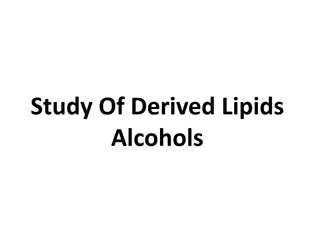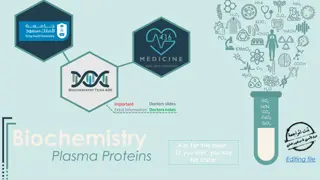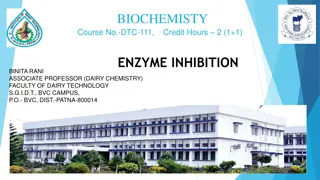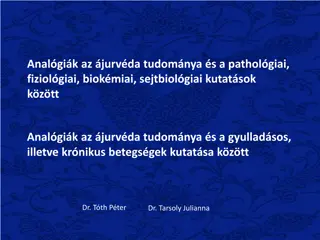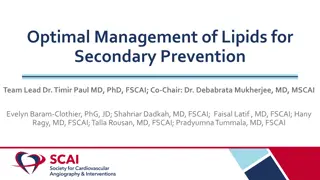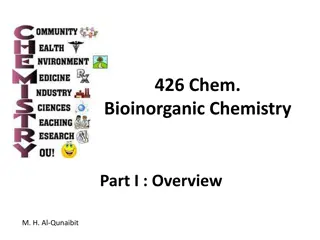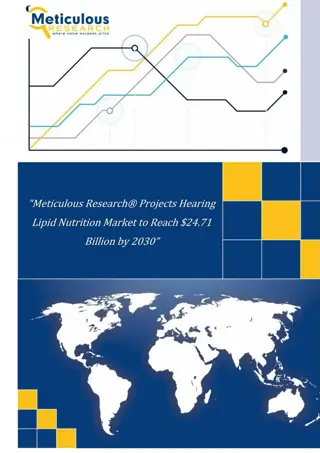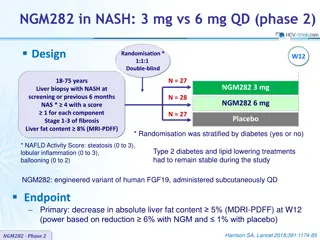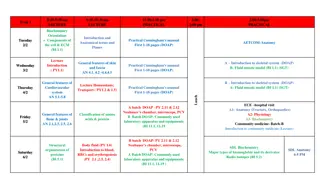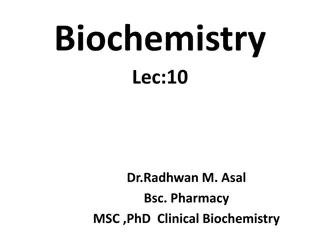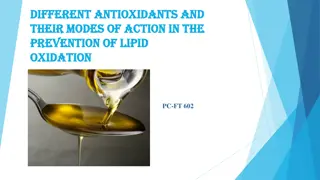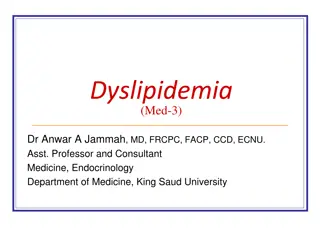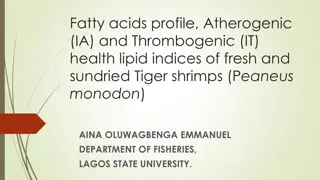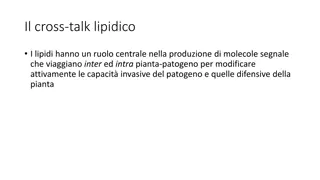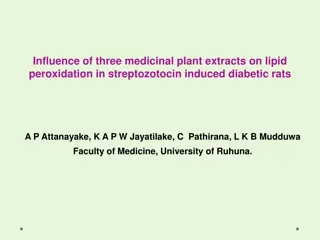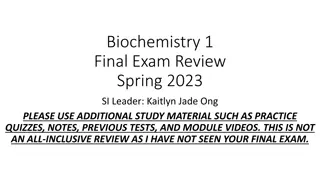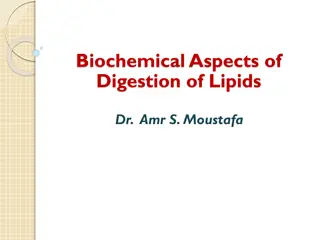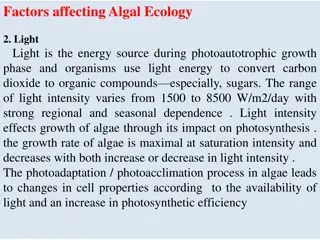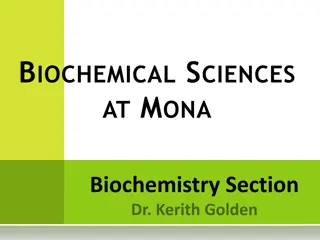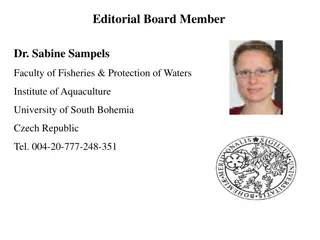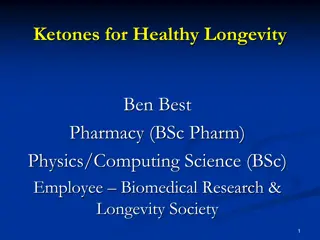Lipid Nutrition Market to Reach $24.71 Billion by 2030
Lipid Nutrition Market by Type (Omega-3, Medium Chain Triglycerides (MCT), Omega-6, Omega-9) Source (Marine, Plant), Form (Liquid, Dry), Application (Dietary Supplements, Food & Beverages, Pharmaceuticals, Animal Feed) - Global Forecast to 2030
1 views • 3 slides
Introduction to Biochemistry: Understanding the Chemistry of Life
Biochemistry is the science that delves into the chemical basis of life, focusing on cellular components, biomolecules, metabolism, gene expression, and more. Understanding biochemistry is crucial for comprehending the molecular processes associated with living cells, both in health and disease.
7 views • 58 slides
Exploring Human Biochemistry: Anatomy, Systems, and Diseases
Delve into the intricate world of human biochemistry through a comprehensive exploration of the anatomy, systems, and diseases affecting the body. From the respiratory and circulatory systems to discussions on common ailments like colds, influenza, and pneumonia, this content provides an insightful
4 views • 42 slides
Lipid Nutrition Market to Reach $24.71 Billion by 2030
Key Questions Addressed:\n\nWhat is the current market value of the global lipid nutrition market?\nWhat is the projected growth rate of the lipid nutrition market for the next 5\u20137 years?\nWhat are the historical market sizes and growth rates?\nWhat are the major factors influencing market grow
4 views • 4 slides
Overview of Industrial Biochemistry and Biotechnology
This course outline covers key topics in industrial biochemistry, microbiology, and biotechnology, focusing on the use of microorganisms and molecules to achieve specific goals in production processes. It delves into microbial physiology, genetics, metabolic pathways, enzymes, microbial growth, ferm
0 views • 10 slides
Understanding Cell Membrane Transport: Diffusion and Facilitated Diffusion
Cell membrane transport plays a crucial role in maintaining cellular functions by regulating the movement of substances across the membrane. Diffusion, a passive transport process, allows molecules to move from areas of high concentration to low concentration without energy expenditure. Within diffu
2 views • 20 slides
Overview of Lipids: Classification and Biological Importance
Lipids are organic substances that play a crucial role in biological systems. They include simple lipids, complex lipids like phospholipids and glycolipids, and derived lipids. Simple lipids are esters of fatty acids with various alcohols, while complex lipids are sub-classified based on the type of
2 views • 38 slides
Mechanism of General Anaesthesia Theories: Lipid Solubility, Surface Tension, Microcrystal, Protein Binding
Mechanism of general anaesthesia involves theories focusing on the interaction of anaesthetics with cell membrane components like lipids and proteins. The Lipid Solubility theory emphasizes the importance of an anaesthetic's affinity and solubility in nerve cell membranes, while the Surface Tension
1 views • 10 slides
Mass Spectrometry Analysis of Lipid Species
Detailed mass spectrometry data for various lipid species including APS(34:0), PI(O-36:1), C24(OH) Sulfatide, and PE(O-33:0) is provided in positive mode with corresponding adducts and neutral changes. The MS/MS spectra reveal fragment ions and structural information for each lipid species, aiding i
1 views • 4 slides
Biochemistry of Blood Practical Course Overview
This biochemistry of blood practical course involves various experiments focusing on blood components such as plasma, serum, proteins, enzymes, blood groups, hemoglobin, glucose levels, and more. The course outline includes detailed experiments, marking distribution, guidelines for writing scientifi
3 views • 6 slides
Understanding Lipids: Importance, Digestion, and Absorption
Professor Shraddha Singh's lecture series delves into the significance of lipids, the types of lipids, and the role of bile in digestion. Learn about saturated vs. unsaturated fatty acids, common fatty acids found in lipids, lipid structures, and properties. Explore the diverse types of fats we cons
2 views • 32 slides
Energy Yield from Lipid Oxidation Process
Understanding the energy generation process from lipid oxidation involves the conversion of fatty acids into Acetyl-CoA through multiple rounds of oxidation, which then enter the Krebs cycle to produce ATP. Each round of oxidation results in the production of Acetyl-CoA, NADH, FADH2, and net gains o
0 views • 7 slides
Introduction to Lipid Biosynthesis and Fixed Oils in Pharmacognosy Lecture
In this lecture by Asst. Prof. Dr. Ibrahim Salih, the focus is on lipid biosynthesis, specifically the three phases involved: glycerol formation, fatty acid biosynthesis, and triglyceride production. The classification of fixed oils into drying, semi-drying, and non-drying categories based on their
0 views • 13 slides
Affinity Care Lipid Pathway Summary and Assessment
The Affinity Care Lipid Pathway outlines a systematic approach to assessing lipid/cholesterol blood results in individuals over 16 years old. It includes guidelines for managing cholesterol levels, assessing familial hypercholesterolemia, and determining appropriate medication options based on indiv
0 views • 5 slides
Understanding the Scope and Importance of Biochemistry
Biochemistry is a crucial field that delves into the chemical processes of living organisms at a cellular and molecular level. It aids in understanding diseases, molecular interactions, metabolism, and the origins of life. By studying the structure and function of complex molecules, biochemistry for
3 views • 19 slides
Exploring Alcohols in Lipid Structures and Their Importance
Delve into the world of derived lipids alcohols, such as glycerol, sphingosine, and cholesterol, which play vital roles in various forms of lipids. Learn about the classification of alcohols involved in lipid structures and their significance as derived lipids. Discover how glycerol, a polyol, acts
0 views • 67 slides
Understanding Transamination and Deamination in Biochemistry
Transamination is a vital chemical reaction in biochemistry that transfers amino groups to ketoacids to form new amino acids, playing a crucial role in amino acid metabolism. Enzymes called transaminases facilitate this process, utilizing -ketoglutarate as a key amino group acceptor. The mechanism i
5 views • 17 slides
Understanding Plasma Proteins in Biochemistry Lectures
This informative content discusses the types, functions, and measurement of plasma proteins in biochemistry. It covers the importance of identifying various plasma proteins, their roles in disease diagnosis, and the interpretation of electrophoretic patterns. The lecture overview provides insights i
0 views • 30 slides
Understanding Lipid Compounds and Their Physiological Significance
Explore the world of lipid compounds and their vital roles in the body, including serving as a major energy source, structural components of cell membranes, and key regulatory molecules. Learn about various types of lipids, such as fatty acids, phospholipids, and lipoproteins, and their relevance to
0 views • 24 slides
Understanding Enzyme Inhibition in Biochemistry
Enzyme inhibition plays a crucial role in pharmacology and biochemistry by regulating enzymatic reactions. Inhibitors can be reversible or irreversible, affecting enzyme activity differently. Competitive, uncompetitive, and noncompetitive inhibition types are explained along with examples like diiso
0 views • 20 slides
Integration of Ayurveda in Modern Medicine Clinical Practice
The integration of Ayurveda in modern medicine clinical practice is a growing field focusing on research in pathophysiology, physiology, biochemistry, and cell biology. Ayurveda is being applied to address conditions such as atherosclerosis, stroke, dementia, Parkinson's disease, autoimmune rheumato
0 views • 17 slides
Optimal Management of Lipids for Secondary Prevention Team Study
Lipid management in secondary prevention plays a crucial role in reducing cardiovascular risk. This study led by Dr. Timir Paul aims to address system-level gaps in care, enhance communication for optimal therapy, and empower patients in achieving target lipid levels. By recognizing disparities and
0 views • 28 slides
Exploring Bioinorganic Chemistry: Connecting Inorganic and Biochemistry
Bioinorganic Chemistry bridges the gap between inorganic chemistry and biochemistry, understanding the vital role of inorganic elements in living systems. This interdisciplinary field delves into the structure, function, and exploitation of metal ions in biological processes, emphasizing their inter
0 views • 47 slides
Lipid Nutrition Market by Size, Share, Forecast, & Trends Analysis to 2030
According to the latest report from Meticulous Research\u00ae, the global lipid nutrition market is anticipated to reach $24.71 billion by 2030, with a compound annual growth rate (CAGR) of 8.9% from 2023 to 2030. This growth is primarily driven by r
0 views • 4 slides
NGM282 in NASH Phase 2: 3 mg vs 6 mg QD Randomised Trial
This Phase 2 clinical trial compares the efficacy of NGM282 (3 mg vs 6 mg) versus placebo in patients with NASH. The primary endpoint is a 5% reduction in liver fat content at 12 weeks. Randomisation was stratified by diabetes status, and stable Type 2 diabetes and lipid-lowering treatments were mai
0 views • 6 slides
Biochemistry Orientation, Cell Components, Anatomical Terms, and Practical Sessions Week 1
Delve into the world of Biochemistry with an orientation on cell components and the Extracellular Matrix (ECM). Explore anatomical terms and planes, setting the foundation for further learning. Engage in practical sessions using Cunningham's manual for hands-on experience in the field. Week 1 is pac
0 views • 38 slides
Understanding Lipid Biochemistry: A Comprehensive Overview
Lipids are a diverse group of compounds crucial for various biological functions. They include fats, oils, steroids, and waxes with unique properties essential for energy storage, insulation, and nerve function. Knowledge of lipid biochemistry is pivotal in understanding areas like obesity, diabetes
0 views • 38 slides
Understanding Antioxidants and Their Role in Preventing Lipid Oxidation
Lipid oxidation is a crucial chemical process affecting the quality of fats and oils, leading to off-flavors and toxicity. Antioxidants play a vital role in delaying this oxidation process by scavenging free radicals through mechanisms like free radical scavenging. They help prolong the shelf life a
0 views • 12 slides
Understanding Dyslipidemia and Lipid Transport in Atherosclerosis
Dyslipidemia is characterized by abnormal levels of lipids in the blood, leading to atherosclerosis. Lipid transport mechanisms play a crucial role in the formation and progression of atheromas in artery walls. Chylomicrons carry fats from the intestine to the liver, where they are processed into LD
0 views • 54 slides
Fatty Acids Profile and Health Lipid Indices of Tiger Shrimps
Seafood lipids, including Tiger shrimps like Peaneus monodon, are rich in essential fatty acids such as EPA, DHA, and AA. This study focuses on the fatty acids profile, atherogenic (IA), and thrombogenic (IT) health lipid indices of fresh and sundried Tiger shrimps, shedding light on the effects of
0 views • 19 slides
Role of Lipids in Plant-Pathogen Interaction
Lipids play a central role in signal molecule production for actively modifying the invasive capabilities of pathogens and the defensive mechanisms of plants during inter and intra-plant-pathogen interactions. They are essential constituents of membranes, providing structural support and serving div
0 views • 43 slides
Influence of Medicinal Plant Extracts on Lipid Peroxidation in Diabetic Rats
Traditional medicinal plant knowledge plays a crucial role in diabetes treatment. Free radicals and oxidative stress are key factors in diabetic complications. This study investigates the effects of three plant extracts on lipid peroxidation in diabetic rats, highlighting the potential benefits of n
0 views • 20 slides
Biochemistry 1 Final Exam Review Spring 2023 SI Leader: Kaitlyn Jade Ong
Review materials for the Biochemistry 1 final exam include topics on membrane transport, lipid structures, melting points of fatty acids, calcium transport mechanisms, Na⁺-K⁺-ATPase classification, adenylate cyclase signaling pathway regulation, and Ras signaling pathway proteins inactivation.
0 views • 14 slides
Biochemical Aspects of Lipid Digestion by Dr. Amr S. Moustafa
This lecture by Dr. Amr S. Moustafa covers the biochemical aspects of lipid digestion, including the process, organs involved, enzymes required, and end products. It discusses the assembly, metabolism, and fate of chylomicrons, as well as the clinical manifestations of diseases related to defective
0 views • 31 slides
Biochemistry and Chemistry Elective Courses Overview at SRCASW
The Shaheed Rajguru College of Applied Sciences for Women offers elective courses in Biochemistry and Chemistry. The Biochemistry course covers biomolecules like amino acids, proteins, carbohydrates, lipids, and nucleic acids, emphasizing their properties and functions. It also includes practical ex
0 views • 19 slides
Factors Affecting Algal Ecology: Light Intensity Impacts on Algae Growth and Composition
Light intensity plays a crucial role in the growth and composition of algae. Algae undergo photoadaptation processes to adjust to varying light levels, affecting their photosynthetic efficiency and cellular properties. High light intensity can lead to photoinhibition and changes in cellular composit
0 views • 19 slides
Department of Biochemical Sciences at MONA: Biochemistry Section, Academic Staff, Research Highlights, and Courses Offered
Explore the prestigious Department of Biochemical Sciences at MONA, specializing in Biochemistry, Anatomy, Physiology, Pharmacology, Physical Therapy, and Dentistry. Learn about the dedicated academic staff, research highlights in medical and plant biochemistry, and offered degrees. Discover the com
0 views • 11 slides
The Future of Algae Fuel: A Promising Solution for America's Energy Needs
Algae biofuel technology is essential for improving fuel sources in America. Algae's high lipid content makes it a pure source of biodiesel, with bio-engineered strains now containing up to 80% lipid. Algae fuel production, while promising, is a tedious and expensive process. Despite the challenges,
0 views • 8 slides
Dr. Sabine Sampels: Research on Aquaculture, Fish Quality, and Human Health
Dr. Sabine Sampels, a member of the Editorial Board at the University of South Bohemia, Czech Republic, specializes in studying the effects of fish consumption on human health, animal nutrition on fish quality, and lipid metabolism. With a background in Food Chemistry and extensive research experien
0 views • 25 slides
Benefits of Ketones in Promoting Longevity and Health
Explore the benefits of ketones in promoting healthy longevity, including the chemistry, biochemistry, and physiology behind ketones, ketogenic diet benefits, and their role in managing diseases like epilepsy, cancer, and neurodegenerative conditions. Learn how a low-carbohydrate ketogenic diet can
0 views • 40 slides
